Reference Books
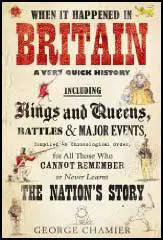
Title: When it Happened in Britain
Author: George Chamier
Editor:
Publisher: Constable & Robinson
Price: £9.99
Bookshop: Amazon
Spartacus Website: British History
Category:
This is a whistle-stop tour through 2,000 years of our nation's story from the Roman invasion to the Falklands War. Setting out the wide sweep of British history that is often ignored, historian George Chamier weaves together a reader-friendly combination of key dates with linking narrative. Here are all our good Kings and usurpers, low dealings and acts of heroism, moments of great conquest, empire or defeat - and through it all the story of the formation of the United Kingdom. All told in lively and amusing short chapters, this is the perfect book for the person who can never quite remember the key dates in British history or feels exasperated that their friends and family are so ignorant of British history.
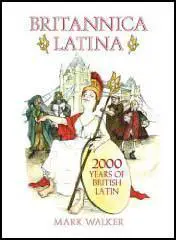
Title: Britannica Latina
Author: Mark Walker
Editor:
Publisher: History Press
Price: £9.99
Bookshop: Amazon
Spartacus Website: British History
Category:
Beginning with what the Romans themselves had to say about far-flung Britain, "Britannica Latina" presents Latin selections from British writers covering a period of 2000 years in the same user-friendly format as "Annus Horribilis" and "Annus Mirabilis". This fascinating miscellany of Anglo-Latin includes tales of King Arthur from the histories by Nennius and Geoffrey of Monmouth: the wizardry of Merlin from Geoffrey of Monmouth's Vita Merlini; the martyrdom of St Alban as told by the Venerable Bede; extracts from Domesday Book and Magna Carta; and, the Laws of Motion explained by Isaac Newton in his Principia Mathematica. Each chapter includes historical and biographical background information and informative grammatical notes, making translation fun for all Latinists. Full English translations are given at the back of the book. It's time for British Latinists to reclaim their heritage.
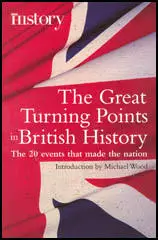
Title: The Great Turning Points in British History
Author: Michael Wood
Editor:
Publisher: Constable & Robinson
Price: £8.99
Bookshop: Amazon
Spartacus Website: British History
Category:
Twenty of the most crucial moments in Britain’s history. BBC History Magazine asked a selection of leading historians to choose and describe the twenty most important turning points in British history from AD 1000 to 2000. Collected together, their choices present a new way of looking at our nation’s story. From the Danish invasion of Britain in 1016, to the Suez crisis in 1956, the key moments include victories (or defeats) both at home and abroad, plague, reform and even revolutions that have reshaped the British way of life. Each contribution brings the past to life, offering new perspectives and food for debate: did the Battle of Agincourt change England’s role in Europe? What was the impact of American independence on Britain? Was 1916 more important than 1939? Thought-provoking and inspiring accounts.
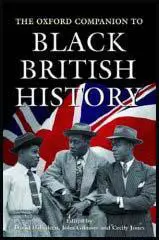
Title: Black British History
Author: David Dabydeen
Editor:
Publisher: Oxford University Press
Price: £30.00
Bookshop: Amazon
Spartacus Website: Black People in Britain
Category:
The Oxford Companion to Black British History is essential reading for anyone who wants to understand the long and fascinating history of black people in the British Isles, from African auxiliaries stationed on Hadrian's Wall in the 2nd century AD, through John Edmonstone, who taught taxidermy to Charles Darwin, Mary Seacole, the 'Black Florence Nightingale', and Walter Tull, footballer and First World War officer, to our own day. It considers such key concepts as Emancipation and Reparations. It is also timely: the Qualifications and Curriculum Authority highlighted in their annual report of December 2005 the need to give more attention to the wider teaching of black history. OCBBH brings together a unique collection of articles which provides an overview of the black presence in Britain, and the rich and diverse contribution made to British society.
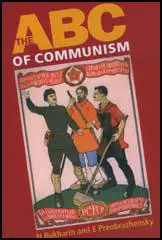
Title: The ABC of Communism
Author: N. Bukharin and E. Preobrazhensky
Editor:
Publisher: Merlin Press
Price: £15.95
Bookshop: Amazon
Spartacus Website: Russian Revolution
Category:
In 1919, in the midst of chaos and destruction, communists in Russia wrote a short programme to set out priorities and goals. Next year came The ABC of Communism, an extended popular guide to the Programme. A new Afterword poses critical questions: How realistic was the programme? How did critics view this programme? These three texts provide historical insights and critical perspectives; they explore and explain what communism was... or might be?

Title: The Faber Book of Utopias
Author: John Carey (editor)
Editor:
Publisher: Faber & Faber
Price: £9.99
Bookshop: Amazon
Spartacus Website: Yevgeny Zamyatin
Category:
Every age has its utopias, from Plato's Republic to contemporary sci-fi visions. In this spellbinding anthology John Carey charts the course of every conceivable dream world - whether communist, fascist, anarchist, green, golden age, techno-fantastic or hermaphroditic - combining a broad historical sweep with lively variety. An experienced and imaginative anthologist, editor of The Faber Book of Reportage and The Faber Book of Science, Carey has gathered together a vast range of texts from Ancient Egypt to modern California, the authors of which, in different ways, attempt to describe a better world than our own.
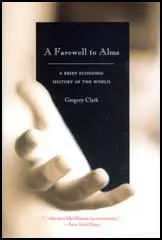
Title: A Farewell to Alms: A Brief Economic History of the World
Author: Gregory Clark
Editor:
Publisher: Princeton University Press
Price: £17.95
Bookshop: Amazon
Spartacus Website: Industrial Revolution
Category:
Why are some parts of the world so rich and others so poor? Why did the Industrial Revolution - and the unprecedented economic growth that came with it - occur in eighteenth-century England, and not at some other time, or in some other place? Why didn't industrialization make the whole world rich - and why did it make large parts of the world even poorer? In A Farewell to Alms, Gregory Clark tackles these profound questions and suggests a new and provocative way in which culture--not exploitation, geography, or resources - explains the wealth, and the poverty, of nations. Countering the prevailing theory that the Industrial Revolution was sparked by the sudden development of stable political, legal, and economic institutions in seventeenth-century Europe, Clark shows that such institutions existed long before industrialization. He argues instead that these institutions gradually led to deep cultural changes by encouraging people to abandon hunter-gatherer instincts-violence, impatience, and economy of effort-and adopt economic habits-hard work, rationality, and education.
